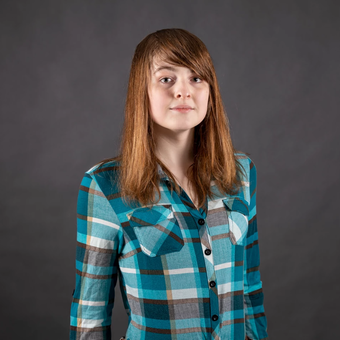Chloe Eggleston '23 Named Fall 2022 Rising Researcher

Chloe Eggleston '23 uses state-of-the-art artificial intelligence techniques to process large swaths of text on social media in order to study sociological phenomena.
What drew you to this field of study?
As a kid, I was always interested in puzzles and patterns, so fields like mathematics, computer science, and linguistics appeal to me. My specific area, natural language processing, which combines the study of computer science and computational linguistics, balances the analytical intrigue of computing and the humanistic element of language.
As a society, we have constructed more data in the form of user-generated content on the Internet than any library in history. I'm excited to be immersed in the philosophical and ethical complexities of this emerging field of the information era.
How do you conduct your research?
In my research, I apply natural language processing (NLP) to social media, using state-of-the-art techniques for processing text. Typically, I apply artificial intelligence techniques to tasks such as sorting sentences into various categories; transforming raw text to structures with labels like "subject," "adjective modifier," "direct object," etc.; and labeling the words in a sentence that correspond to known people, organizations, or places. I read the latest literature to select a model for experimentation, establish a means to implement the model, and train the model for the data we want to study.
Once my research team has established satisfactory models, we apply them to large swaths of social media data, typically to study sociological phenomena. Because social media is a newer frontier, our applications towards it must be both more precise (as this type of work is rarely completely replicable) and more intuitive (as there are nearly limitless social factors at play).
What do you see as the impact--or potential impact--of your work?
Scientists do not yet have the tools to adequately analyze social media. It is fast, informal, and consists of text rather than numbers or physical features. Scientists working outside of social media companies cannot experiment on it; they can only observe it and try to study its motions. Yet the impact of social media on the lives of millions is profound, and it spawns many modern ills and benefits. As scientists, we have a professional obligation to understand these systems for the benefit of our society and the advancement of knowledge.
How does your faculty mentor support your research?
My faculty mentor, Professor Brendan O'Connor in the Manning College of Information and Computer Sciences, provides his time to review my work weekly, giving me context on how my work relates to previous NLP research and approaches that may prove fruitful. He has also helped me network with the wider UMass NLP community, providing me with plenty of collaborators and peers to learn from. As an undergraduate on a campus with thousands of students in our field, I am beyond grateful for the opportunity for solo guidance from my mentor.
What do you find most exciting about conducting research?
The ability to pursue the unknown, to pursue truth for its own sake, and to develop human knowledge at large--these are the fundamental pursuits that give research its flair. There's little more stimulating than seeing one's intuitions confirmed in reality and recognized due to their merit.
What are you most proud of?
My material accomplishments mean little when compared with the sheer perseverance I've developed as a student researcher. Research is often frightening and unfair; you can work for months and get nowhere, or you can have a breakthrough when you are barely putting in any effort. Even getting involved in research in computer science, mathematics, and other disciplines that don't have concrete lab work has an enormous barrier to entry that I almost didn't get through. But because I kept trying despite rejection and failure, I now have a wonderful career, present and future.
How has your research enhanced your overall educational experience at UMass?
Research contextualizes the learning experience much like how learning to cook helps you appreciate the labor put into your meals at a restaurant. It gives insight into "how the sausage is made," and illustrates that these disciplines we learn aren't made overnight. When researching towards a goal, learning is never a chore; it's part of the hunt for that spark of innovation. I've found this form of motivation makes the educational process infinitely less draining and more fulfilling.
What are your plans for the future?
I am currently applying to graduate school, and hope to continue my research in a PhD program in either Computer Science or Computational Linguistics. After that, my plans are rather open, as long as I am pursuing research that interests me.
Why would you recommend UMass to a friend?
UMass has provided me with an environment to self-actualize. The computer science curriculum here was designed with such care and love for the discipline that, despite our large class sizes, I always felt respected as a student. At UMass, I've met professors who go to extreme lengths to ensure their students learn--such as answering student message board posts at 3 a.m.-- and have had the opportunity to dedicate my time to the educational process through my work as an undergraduate course assistant.
Most of all, I don't think I would be who I am today without the collective efforts of the UMass faculty and student body. As UMass was instrumental in the development of my identity, I cannot recommend it enough. I have so much to be thankful for, and it's all thanks to UMass.
Originally published by the UMass Amherst Office of News & Media Relations.